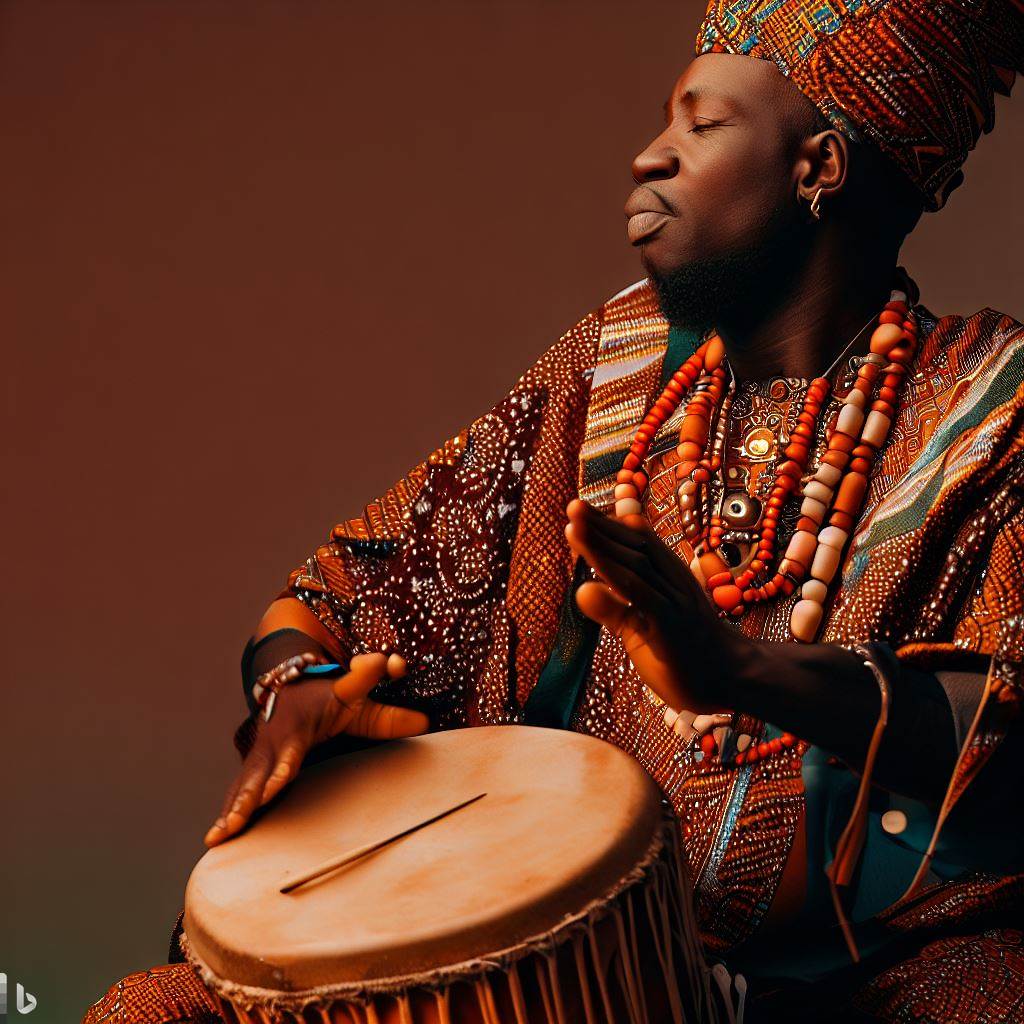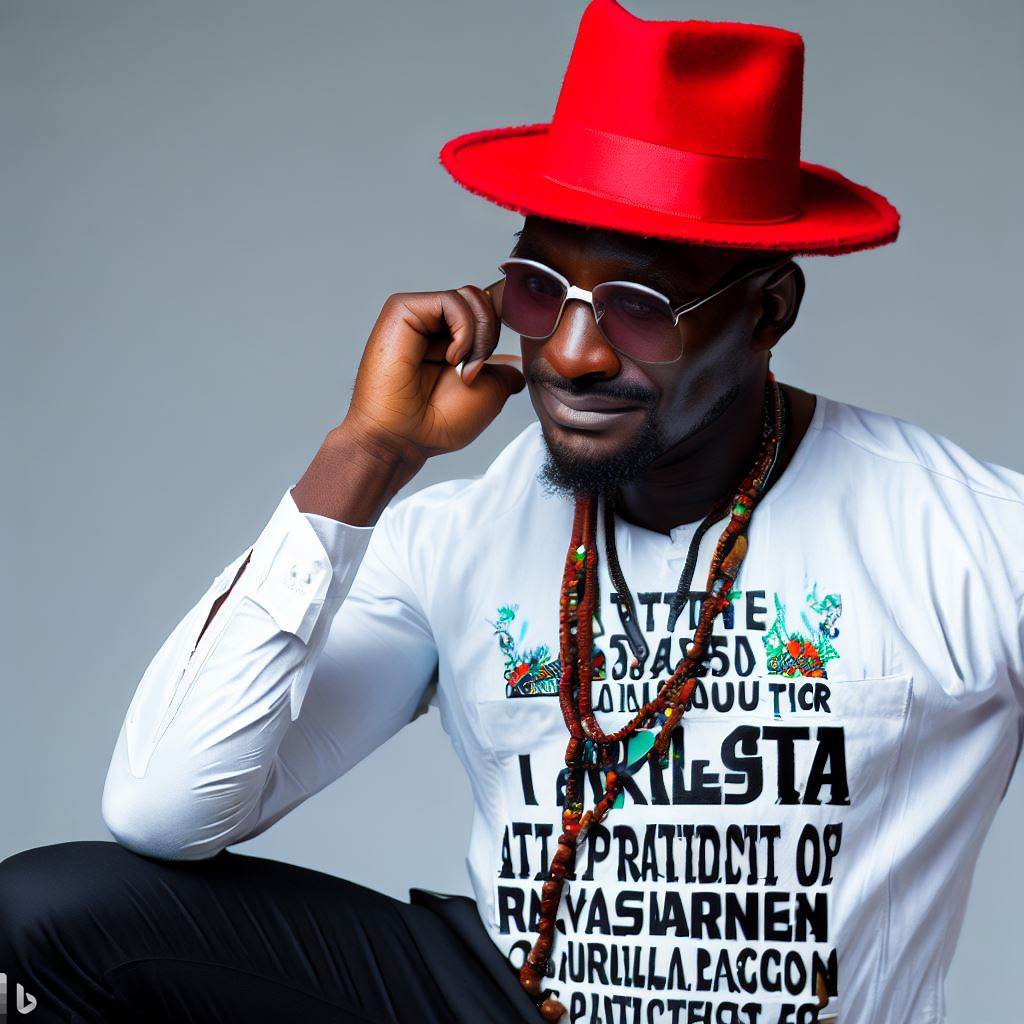Introduction
The Nigerian music industry is a vibrant and thriving sector of the country’s entertainment scene and the Culture in Nigerian Music Direction
Culture plays a significant role in shaping the direction and style of Nigerian music.
Culture has exerted a profound influence on the direction of Nigerian music.
The Pulse of Nigerian Music
- Introduction: Nigeria’s music industry is a vibrant tapestry, blending tradition, diversity, and modernity.
- Variety of Genres: It encompasses a wide array of genres, from Afrobeat and Highlife to Hip-hop and Gospel.
- Global Impact: Nigerian music resonates globally, shaping contemporary music trends and winning international acclaim.
The Cultural Significance in Music Direction
- Cultural Heritage: Culture is the heartbeat of Nigerian music, with artists often drawing from their rich traditions.
- Language and Lyrics: It influences the choice of languages and lyrical themes, celebrating Nigeria’s diversity.
- Rhythmic Diversity: Cultural rhythms and instruments infuse unique energy into songs, setting them apart.
- Fashion and Visuals: Music videos and stage performances reflect Nigeria’s cultural fashion and aesthetics.
- Identity and Storytelling: Nigerian music tells stories of identity, resilience, love, and societal issues through a cultural lens.
Thesis Statement:
Culture has been a driving force shaping the direction of Nigerian music, enriching its diversity and global appeal.
Traditional Nigerian Music
The rich history of traditional Nigerian music
- Traditional Nigerian music dates back centuries and reflects the country’s diverse ethnic groups.
- Each ethnic group has its unique musical styles, instruments, and performance techniques.
- Traditional music plays a significant role in ceremonial events, social gatherings, and religious rituals.
- The music showcases the cultural heritage, values, and beliefs of the Nigerian people.
The cultural elements embedded in traditional music
- Traditional Nigerian music incorporates various cultural elements such as language, dance, and storytelling.
- Indigenous languages are often used in songs, preserving the linguistic diversity of the country.
- Dance is an essential aspect, with different movements and styles representing specific occasions and emotions.
- Traditional music also serves as a means of storytelling, passing down myths, history, and moral lessons.
Traditional music has shaped contemporary Nigerian music
- Traditional Nigerian music has greatly influenced contemporary genres such as Afrobeat, highlife, and juju music.
- Artists like Fela Kuti and King Sunny Ade have blended traditional elements with modern instruments and styles.
- Traditional rhythms and melodies are frequently incorporated into popular Nigerian songs, creating a unique sound.
- The use of traditional instruments like the talking drum, shekere, and ogene gives a distinct Nigerian touch to modern music.
Traditional Nigerian music holds immense cultural significance and has had a profound impact on contemporary Nigerian music.
Its rich history, cultural elements, and unique blend of traditions continue to shape the direction and style of Nigerian music today.
By embracing their cultural roots, Nigerian musicians are able to create music that resonates with both local and global audiences.
Fusion of Nigerian Music Styles
The fusion of traditional and modern music styles
Nigerian music is a fascinating blend of traditional and modern music styles.
The fusion of these two forms has created a unique sound that mesmerizes listeners both within and outside the country.
This fusion can be traced back to the historical and cultural influences that have shaped Nigerian music over the years.
Traditional Nigerian music is deeply rooted in the country’s diverse ethnic groups.
Each group has its distinctive musical style, instruments, and rhythms. These traditional music styles are steeped in cultural significance and are passed down from generation to generation.
They are the foundation on which Nigerian music is built.
However, as Nigeria embraced modernity and Western influences, its music scene underwent a significant transformation.
Western music genres, such as jazz, rock, and reggae, started gaining popularity among Nigerian musicians.
At the same time, Nigerian artists began experimenting with incorporating these modern styles into their traditional music.
Explore the incorporation of Afrobeat, Juju, Highlife, and other genres
One genre that played a pivotal role in the fusion of Nigerian music styles is Afrobeat.
Created by the legendary musician Fela Kuti in the 1970s, Afrobeat combined elements of jazz, funk, highlife, and traditional Nigerian music.
Its infectious rhythms and politically charged lyrics struck a chord with Nigerians and gained international recognition.
Artists like Burna Boy and Wizkid continue to keep Afrobeat alive today.
Another influential genre in the fusion of Nigerian music styles is Juju.
Originating from the Yoruba people of southwestern Nigeria, Juju music blends traditional percussion instruments with electric guitars and brass instruments.
Popularized by artists like King Sunny Ade and Ebenezer Obey, Juju music gained global recognition and contributed to the diverse sound of Nigerian music.
Highlife is yet another genre that has played a significant role in the fusion of Nigerian music.
Originating in Ghana but later embraced by Nigerian musicians, Highlife combines African rhythms with Western instruments like the guitar and trumpet.
Artists like Sir Victor Uwaifo and Osita Osadebe helped popularize Highlife in Nigeria, and its influence can still be heard in contemporary Nigerian music.
Furthermore, Nigerian music has also embraced other genres such as reggae, hip-hop, and RnB, further expanding its sonic repertoire.
Artists like 2Face Idibia, D’banj, and Tiwa Savage have successfully blended these genres with traditional Nigerian elements, creating a unique blend that appeals to a wide audience.
How this fusion has contributed to the unique sound of Nigerian music
The fusion of traditional and modern music styles in Nigeria has resulted in a truly unique sound that sets Nigerian music apart.
It has opened up opportunities for Nigerian artists to explore a wide range of musical expressions and experiment with new sounds.
This fusion has also helped Nigerian music gain international recognition and attract a global audience.
Moreover, the incorporation of traditional elements in Nigerian music has preserved and celebrated the diverse cultural heritage of the country.
It has allowed younger generations to connect with their roots while embracing modernity.
Through this fusion, Nigerian artists have developed a sonic identity that is distinctly Nigerian and resonates with listeners worldwide.
The fusion of Nigerian music styles, specifically the blending of traditional and modern elements, has created a captivating and unique sound.
Genres like Afrobeat, Juju, Highlife, and the incorporation of various other influences have contributed to the development of Nigerian music as we know it today.
This fusion not only showcases the talent and creativity of Nigerian artists but also serves as a celebration of the rich cultural heritage of the country.
Read: Understanding the Role of a Make-up Artist in Nigeria’s Fashion
Lyrics and Language
Analyze the role of language in Nigerian music
- Language plays a crucial role in Nigerian music, shaping its identity and cultural significance.
- Nigerian musicians use language to express emotions, tell stories, and convey meaningful messages to their audience.
- Language adds depth and richness to the lyrics, making the music more relatable and impactful.
- Nigerian music often incorporates local languages, showcasing the diversity and beauty of the country’s linguistic landscape.
- Language allows artists to connect with their listeners on a deeper level, bridging the gap between cultures.
The use of Nigerian dialects in lyrics
- Nigerian musicians frequently utilize various dialects in their lyrics, reflecting the country’s multiethnic composition.
- Dialects add authenticity and local flavor to the music, giving it a distinct Nigerian sound.
- By incorporating different dialects, artists celebrate Nigeria’s linguistic diversity and promote cultural unity.
- Nigerian dialects bring a sense of identity and pride to the music, creating a stronger connection with the audience.
- This use of dialects also preserves traditional languages that may otherwise be in danger of fading away.
Language choice reflects cultural identity and influences music direction
- The choice of language in Nigerian music reflects the cultural identity of the artist and their intended audience.
- Artists often select languages that are widely understood and appreciated by people across Nigeria.
- Language choice can also be a strategic decision to reach a specific target audience, such as using English to appeal to international listeners.
- Language influences the overall direction of the music, shaping the rhythms, melodies, and vocal styles utilized.
- By embracing their native languages, Nigerian musicians maintain a connection to their roots and preserve their cultural heritage.
Language holds a significant role in Nigerian music, influencing its direction and cultural impact.
From lyrics to dialects, language choice reflects the unique identity of Nigerian artists and celebrates the country’s linguistic diversity.
Through the power of words, Nigerian musicians connect with their audience, conveying meaningful messages, and bridging cultural divides.
Read: Unveiling Nigeria’s Top-Rated Make-Up Artists: A Review
Dance and Performance
Importance of Dance in Nigerian Music
- Dance plays a significant role in Nigerian music, serving as a visual representation of the rhythm.
- It complements the music, giving it a physical form and allowing for self-expression.
- Dance helps to communicate emotions, cultural stories, and societal messages to the audience.
Traditional Dances Incorporated in Performances
Nigerian music performances incorporate various traditional dances, each representing different cultures and ethnic groups.
The famous “Azonto” dance from Ghana has also been adopted and incorporated into Nigerian music performances.
Other popular Nigerian dances include the “Shoki,” “Etighi,” “Skelewu,” and the “Zanku” dance.
Influence of Dance Styles on Nigerian Music Direction
- Different dance styles have influenced the direction of Nigerian music in various ways.
- The energetic and rhythmic dance styles have shaped the beats, melodies, and overall sound of Nigerian music.
- Artists often create dance-friendly songs to encourage audience participation and enhance the overall performance experience.
- The fusion of traditional dance styles with modern music genres like afrobeats has reinvented Nigerian music.
- Artists like Fela Kuti and Davido have used dance as a form of activism and a means to convey social and political messages.
- Afrobeats dance moves like the “Gbese” and “Zanku” have become iconic dance crazes, spreading globally through music videos and dance challenges.
Dance styles have had a profound influence on the direction of Nigerian music by shaping its rhythms, lyrics, themes, fusion of genres, visual aesthetics, and cultural preservation.
Read: Exploring the Nigerian Animation Market: An Overview

See Related Content: Interviews with Nigeria’s Top Music Producers: Insight & Advice
Social and Political Commentary
The use of music as a medium for social and political messages
- Music in Nigeria has been a powerful tool for expressing social and political concerns.
- Artists often use their lyrics to critique government corruption and societal issues.
- Songs like Fela Kuti’s “Zombie” and “Gentleman” served as direct protests against military rule.
- The use of music allows for a wide reach and easier dissemination of messages to the masses.
- Artists intertwine their music with activism, sparking social movements and inspiring change.
- The power of music as a medium lies in its ability to connect with people emotionally.
- Through their songs, artists in Nigeria have motivated the masses to demand change and accountability.
- Music has served as a catalyst for social and political movements, fostering unity among citizens.
- Nigerian musicians have become influential figures in advocating for social justice and equality.
- The use of music as a platform for social and political commentary is deeply embedded in Nigerian culture.
Influence of cultural values and traditions on lyrical content
- Nigerian music reflects the rich cultural heritage and diversity of the nation.
- Lyrical content often incorporates traditional languages, proverbs, and folklore.
- Cultural values such as respect for elders, communalism, and religious beliefs are often emphasized.
- Artists use their music to celebrate Nigerian traditions and express national pride.
- Musical genres like juju, highlife, and afrobeat draw inspiration from indigenous rhythms and melodies.
- The influence of cultural values on lyrical content helps preserve and promote Nigerian heritage.
- Artists like King Sunny Ade and Osita Osadebe have popularized traditional music, making it globally recognized.
- Nigerian musicians serve as cultural ambassadors, spreading awareness and appreciation of their heritage.
- Traditional dance forms and costumes are often incorporated into music videos and live performances.
- Through their lyrical content, Nigerian musicians ensure the continuity of cultural values for future generations.
How music reflects the sociopolitical climate of Nigeria
- Nigerian music serves as a mirror of the sociopolitical climate in the country.
- Songs often highlight the struggles, inequalities, and aspirations of the Nigerian people.
- During periods of political unrest, music becomes more outspoken and critical of the government.
- Artists express the frustrations and hopes of the citizens through their lyrics and melodies.
- Sociopolitical events like elections, protests, and social movements directly influence the music produced.
- Historical events like the Nigerian Civil War and the fight against apartheid shaped the music of that era.
- The sociopolitical climate impacts the themes and tone of the music, reflecting the prevailing mood of the nation.
- By analyzing the lyrics and messages in Nigerian music, one can gain insights into the country’s challenges and aspirations.
- Music acts as a powerful tool for documentation and expressing the shared experiences of Nigerians.
- Through music, Nigerians find solace, unity, and hope in the midst of sociopolitical turmoil.
Nigerian music has a profound impact on society and politics.
It serves as a medium for social and political messages, allowing artists to express their concerns, ignite activism, and inspire change.
Lyrical content is deeply rooted in cultural values and traditions, emphasizing Nigerian heritage and promoting national pride.
Music reflects the sociopolitical climate of Nigeria, capturing the struggles, aspirations, and mood of the nation.
The influence of culture in Nigerian music direction is evident in its ability to shape and influence society, making it an essential part of Nigerian identity.
Read: The Impact of Nollywood on Makeup Artistry in Nigeria
Find Out More: Health and Safety Tips for Nigerian Circus Artists
Uncover the Details: Career Progression for Artists’ and Performers’ Agents
Explore Further: How Performers’ Agents Shape Nigeria’s Music Scene
International Recognition and Influence
The global popularity of Nigerian music
- Nigerian music has gained immense popularity across the globe in recent years.
- Artists like Burna Boy and Wizkid have won international awards and gained massive followings.
- Nigerian music has been featured on international music charts and playlists, reaching a global audience.
How cultural richness attracted worldwide attention
- The cultural richness embedded in Nigerian music has captivated audiences worldwide.
- The Afrobeat genre, pioneered by Fela Kuti, combines traditional Nigerian music with influences from jazz and funk.
- The unique fusion of rhythms, vibrant melodies, and captivating lyrics in Nigerian music draws global attention.
Influence of Nigerian music on other global genres
- Nigerian music has influenced various global genres, including hip-hop, R&B, and dancehall.
- Artists like Drake and Beyoncé have collaborated with Nigerian musicians, incorporating their sound into their music.
- The infectious beats and catchy hooks of Nigerian music have had a significant impact on the global music scene.
- Nigerian music has also inspired artists to embrace their cultural roots and incorporate African elements into their own work.
- The success of Nigerian music has paved the way for other African musicians to gain recognition on the global stage
- The influence of Nigerian music can be heard in the pop music of countries around the world, showcasing its global impact.
- Nigerian music has transcended language barriers, with artists singing in various Nigerian dialects and English.
- The universal appeal of Nigerian music lies in its ability to make people dance and connect with its infectious energy.
- International recognition of Nigerian music has opened doors for collaborations and cultural exchanges between artists from different countries.
- The popularity of Nigerian music has boosted tourism and cultural exchange, with more people traveling to Nigeria to experience its music scene firsthand.
Nigerian music has achieved significant international recognition and influence.
Its global popularity, cultural richness, and influence on other genres have captivated audiences worldwide.
Nigerian music has not only inspired artists but also opened doors for collaborations and cultural exchanges.
The impact of Nigerian music extends beyond the entertainment industry and has contributed to the country’s economy and cultural diplomacy.
It has truly put Nigeria and African music on the global map.
Gain More Insights: Freelance vs Agency: Pros and Cons for Nigerian Costume Designers
Conclusion
The main points discussed in the blog post
In this blog post, we explored the influence of culture in Nigerian music direction.
It is evident that culture plays a significant role in shaping Nigerian music in various ways.
Nigerian music is deeply rooted in cultural traditions, languages, and customs, which impact its direction.
The fusion of traditional Nigerian music elements with modern genres showcases the importance of culture.
Importance of culture in shaping Nigerian music direction
Cultural influences are reflected in the lyrics, rhythms, instruments, and dance moves of Nigerian music.
The global success and popularity of Nigerian artists such as Burna Boy and Wizkid demonstrate the power of cultural influence.
Nigerian music has the ability to cross cultural boundaries, bringing people together through its unique and vibrant sounds.
It is crucial to acknowledge and appreciate the role that culture plays in Nigerian music direction.
As Nigeria continues to evolve and embrace new cultural influences, the future of its music looks promising.
Nigerian artists have the opportunity to draw inspiration from their rich cultural heritage while exploring new musical frontiers.
The fusion of diverse cultural elements will continue to shape Nigerian music and contribute to its growth.
The influence of culture in Nigerian music direction is undeniable and crucial to its success.
The future of Nigerian music and cultural influence
As the world becomes more interconnected, Nigerian music stands as a testament to the power of cultural expression.
Let us celebrate and support Nigerian music as it continues to evolve and inspire generations to come.




